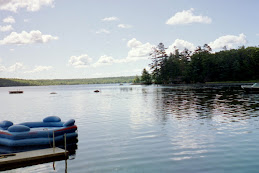- Beyond Library Guides: Libguides as a Platform for Student Research Projects
- Pecha Kucha Presentations of Marketing Ideas that Worked in Academic Libraries
- Library Instruction Live! Reaching Distance Students in Real Time
- Assessment for the Rest of Us
The Library Guides session was given by Phyllis Conn, Institute for Core Studies, St. John's University and Benjamin Tucker, Instructional Services, St. John's University. They teamed up to use a Libguide as a class wiki for a higher level history class. Students contributed writing in the wiki and peer reviewed each others work. LibGuides now has a new product, CampusGuides, which has a broader scope than the LibGuides. The last part of the session was devoted to small group work to develop a project. I worked with Liz Evans on ideas to use LibGuides or CampusGuides for faculty engagement. For example, the faculty survival guide could be maintained in this type of wiki. Faculty Discussion Groups and Faculty Awards could be documented in a wiki. This would make it possible for colleagues to see what new pedagogical techniques are being developed and utilized at Medaille.
The short presentations about marketing gave me the following ideas:
- traveling exhibits give you opportunities to showcase your own collections along with the materials provided; advertise with tents on dining hall tables and screen savers in libraries; program booklets can highlight student and faculty research and writings aligned with the subject matter of the exhibit
- have a year-long theme: one library had a "Year of the Library" with the positive result of increased usage of the spaces and collections
- Mt. St. Mary College began a series of programs connecting the college and the community; a bibliography was included in each program handout; books & DVDs were available for check out at each lecture
- At Illinois Wesleyan University, the staff used ethnographic methods to find out student perceptions, then they included students in all aspects of the marketing, allowing students to recruit and facilitate focus groups; they learned that "reference" meant nothing to students and they now use "Information & Research Assistance" for signage
- At Gettysburg University, the marketing is linked to the mission and vision of the library; they extended their reach beyond campus; faculty involvement was key to success; a Marketing Committee coordinated the look of all materials used for marketing
The session "Assessment for the Rest of Us" provided snapshots of assessment done by academic libraries using a variety of methods. The Cal Arts Student Behaviors and Habits Project, based on some of the work done by the University of Rochester in its Studying Students project, used a variety of interesting and easy ways to get student feedback about the library. The feedback provided leverage for the funding for different printers and computers in the library. Florida State librarians talked with students at the library and outside the library for one month, recording each interview. The feedback was used to reorganize staff and redesign space. Georgia Tech Library used a video assessment to find out student perceptions about the library. Students were asked to video tape and narrate what they saw as they walked through the library. This provided the staff with the patron's perspective. Based on the results of the recorded sessions, the carrels were cleaned of all graffiti and the reference desk was reoriented. At the American University in Dubai, the library staff observed student behavior for 30 minutes, 3 times a week, over a 5 week period, using maps to note observations. From the observations, they were able to make changes to achieve a better balance between high and low use study spaces by reconfiguring study tables and relaxed seating. My overall impression of this session is that assessment can be done on a number of levels to create a culture of assessment. The result of this assessment is that our students and faculty have better learning and teaching experiences.
I spent a great deal of time talking with vendors at the exhibits, including representatives from Oxford University Press, Alexander Street Press, Innovative Interfaces, Gaylord, Gale, Ebsco, WilsonWeb, Mango and Image Access. I also spoke to two RFID vendors: ITG and 3M. The exhibits trade show at ALA is the largest library trade show held in the US annually. I have the opportunity to preview numerous products and resources in one place, making it easy for me to be aware of emerging technologies and new resources.
Attending ALA's Annual Conference is a great opportunity for me to listen to and speak with librarians from all over the United States. I always come back for this conference energized with the possibility of trying new ways to enhance library services at Medaille College.

No comments:
Post a Comment